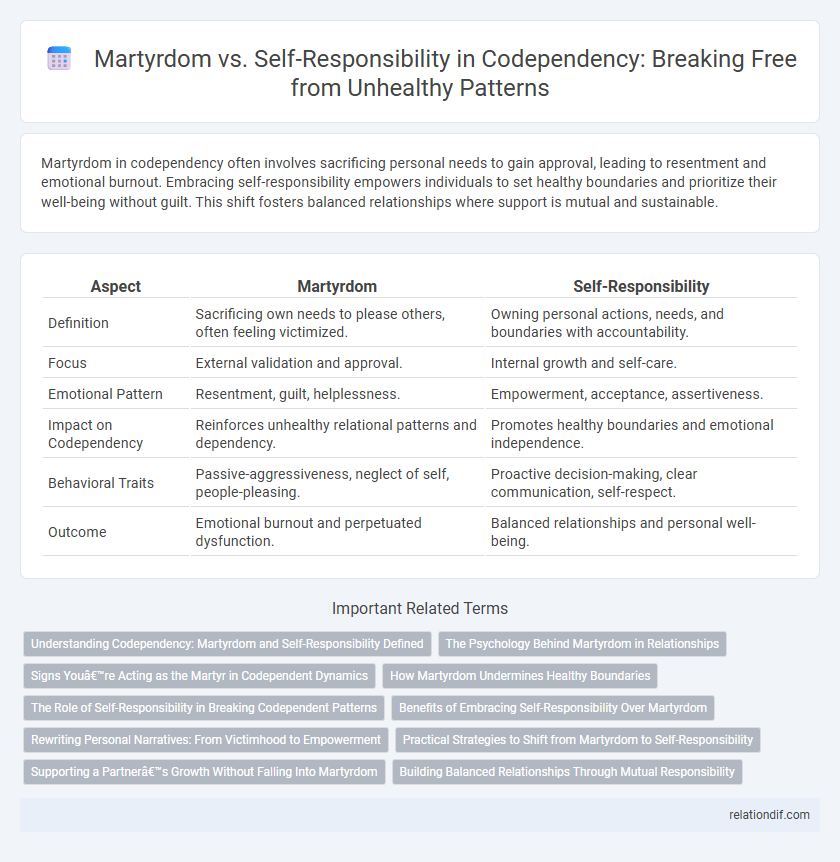Martyrdom in codependency often involves sacrificing personal needs to gain approval, leading to resentment and emotional burnout. Embracing self-responsibility empowers individuals to set healthy boundaries and prioritize their well-being without guilt. This shift fosters balanced relationships where support is mutual and sustainable.
Table of Comparison
| Aspect | Martyrdom | Self-Responsibility |
|---|---|---|
| Definition | Sacrificing own needs to please others, often feeling victimized. | Owning personal actions, needs, and boundaries with accountability. |
| Focus | External validation and approval. | Internal growth and self-care. |
| Emotional Pattern | Resentment, guilt, helplessness. | Empowerment, acceptance, assertiveness. |
| Impact on Codependency | Reinforces unhealthy relational patterns and dependency. | Promotes healthy boundaries and emotional independence. |
| Behavioral Traits | Passive-aggressiveness, neglect of self, people-pleasing. | Proactive decision-making, clear communication, self-respect. |
| Outcome | Emotional burnout and perpetuated dysfunction. | Balanced relationships and personal well-being. |
Understanding Codependency: Martyrdom and Self-Responsibility Defined
Codependency frequently manifests through martyrdom, where individuals sacrifice their own needs to excessively care for others, often leading to emotional burnout. Self-responsibility in codependency involves recognizing one's own boundaries and taking accountability for personal well-being without enabling dysfunctional behaviors. Understanding these distinctions is crucial for breaking unhealthy relational patterns and fostering balanced, mutually supportive connections.
The Psychology Behind Martyrdom in Relationships
Martyrdom in relationships often stems from deep-seated patterns of codependency where individuals sacrifice their own needs to gain approval or maintain connection, resulting in emotional exhaustion and resentment. Psychological drivers include low self-esteem, fear of abandonment, and distorted beliefs about love and sacrifice, which reinforce the martyr's role as indispensable yet unfulfilled. Embracing self-responsibility involves recognizing personal boundaries and fostering mutual respect, shifting from self-neglect to empowered interdependence.
Signs You’re Acting as the Martyr in Codependent Dynamics
Excessive self-sacrifice, persistent feelings of resentment, and neglecting personal needs are clear signs you're acting as the martyr in codependent dynamics. Martyrdom often manifests through overextending yourself to please others while suppressing your own emotions and boundaries. Recognizing this pattern is crucial for cultivating self-responsibility and achieving balanced, healthy relationships.
How Martyrdom Undermines Healthy Boundaries
Martyrdom often leads to blurred personal boundaries by fostering an excessive sense of obligation and self-sacrifice, which diminishes individual autonomy and emotional well-being. This mindset undermines self-responsibility by encouraging dependency on external validation rather than cultivating internal accountability. Establishing healthy boundaries requires recognizing and rejecting martyrdom behaviors to promote balanced relationships and personal growth.
The Role of Self-Responsibility in Breaking Codependent Patterns
Self-responsibility plays a crucial role in breaking codependent patterns by empowering individuals to recognize and address their own needs and boundaries instead of sacrificing their well-being for others. Embracing self-responsibility fosters autonomy and emotional resilience, which counteracts the passive, self-sacrificing tendencies typical of martyrdom in codependency. This shift enables healthier relationships grounded in mutual respect rather than one-sided obligation or guilt.
Benefits of Embracing Self-Responsibility Over Martyrdom
Embracing self-responsibility over martyrdom fosters personal empowerment by encouraging individuals to set healthy boundaries and take control of their own well-being. This shift reduces feelings of resentment and burnout common in codependent relationships, promoting emotional resilience and authentic self-worth. Prioritizing self-responsibility cultivates healthier interpersonal dynamics by enabling clearer communication and balanced support.
Rewriting Personal Narratives: From Victimhood to Empowerment
Rewriting personal narratives shifts the mindset from martyrdom, characterized by self-sacrifice and victimhood, to self-responsibility, emphasizing empowerment and accountability. Embracing self-responsibility fosters healthier boundaries and nurtures autonomy, breaking the cycle of codependency. Transforming these narratives rewires thought patterns, enabling individuals to reclaim control and cultivate resilience in relationships.
Practical Strategies to Shift from Martyrdom to Self-Responsibility
Shifting from martyrdom to self-responsibility involves setting healthy boundaries and practicing assertive communication to express personal needs without guilt. Engaging in regular self-reflection and journaling helps identify patterns of self-sacrifice and fosters accountability for one's own well-being. Implementing mindfulness techniques and seeking support from therapy or support groups enhances emotional awareness and promotes balanced relationship dynamics.
Supporting a Partner’s Growth Without Falling Into Martyrdom
Supporting a partner's growth requires balancing empathy with boundaries to avoid falling into martyrdom, which often involves self-sacrifice and resentment. Embracing self-responsibility empowers individuals to contribute positively without neglecting their own needs or enabling dependency. Cultivating open communication and personal accountability fosters mutual growth and sustains healthy relationship dynamics.
Building Balanced Relationships Through Mutual Responsibility
Martyrdom in codependent relationships often manifests as self-sacrifice that undermines personal boundaries and fosters imbalance, whereas self-responsibility promotes accountability and healthy autonomy. Building balanced relationships requires mutual responsibility where both individuals recognize their needs, communicate openly, and support each other's growth without guilt or resentment. Emphasizing self-responsibility encourages emotional resilience and equitable partnership, essential for sustainable, fulfilling connections.
Martyrdom vs Self-responsibility Infographic

 relationdif.com
relationdif.com